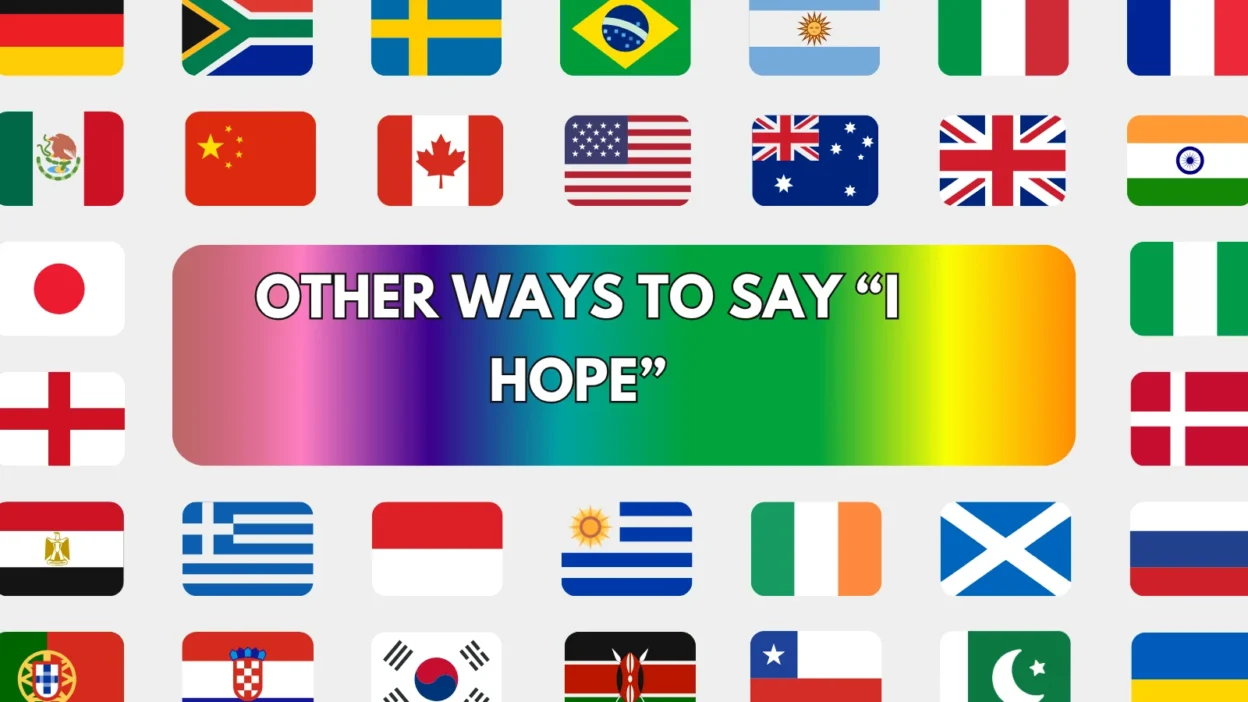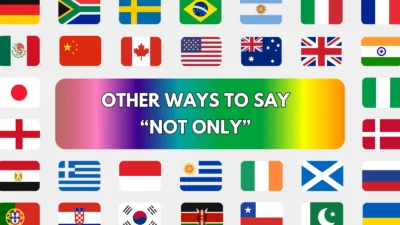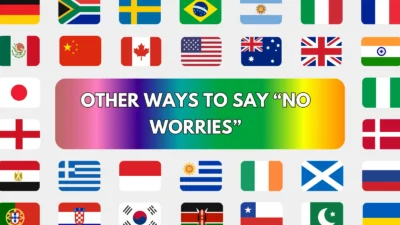The phrase “I hope” is used every day to express wishes, desires, or optimism about a future outcome. Whether you’re writing an email, offering encouragement, or expressing kindness, “I hope” is a go-to phrase. But using the same phrase too often can make your communication feel repetitive.
In this article, you’ll discover 25 thoughtful and versatile alternatives to “I hope.” Each one adds variety and clarity to your speech and writing, whether in a personal message, professional email, or heartfelt note.
1. I trust
Meaning:
Expresses confidence that something will happen or is already true.
Detailed Explanation:
“I trust” sounds slightly more confident and formal than “I hope,” often used in business communication.
Scenario Example:
I trust this message finds you well and in good health.
Best Use:
Professional emails, formal writing.
Tone:
Confident, courteous.
2. Wishing you
Meaning:
A way to extend warm wishes for someone’s wellbeing or success.
Detailed Explanation:
This phrase is commonly used to offer good thoughts, especially in greetings or closings.
Scenario Example:
Wishing you a restful weekend and some well-deserved peace.
Best Use:
Personal messages, greeting cards.
Tone:
Warm, friendly.
3. Fingers crossed
Meaning:
A casual way to say you’re hoping for a good result.
Detailed Explanation:
This idiom adds a playful tone to expressing hope and anticipation.
Scenario Example:
Fingers crossed your interview goes great tomorrow!
Best Use:
Informal conversations, messages to friends.
Tone:
Casual, encouraging.
4. I’m optimistic that
Meaning:
Indicates a positive outlook about something happening.
Detailed Explanation:
This phrase shows confidence, especially in professional or motivational contexts.
Scenario Example:
I’m optimistic that our project will meet the deadline.
Best Use:
Team meetings, leadership messages.
Tone:
Positive, professional.
5. It would be great if
Meaning:
Expresses a desire or hopeful thought about something happening.
Detailed Explanation:
Softens the statement and makes it sound like a gentle wish rather than an expectation.
Scenario Example:
It would be great if we could finalize everything by Friday.
Best Use:
Collaborative writing, requests.
Tone:
Polite, hopeful.
6. Hopefully
Meaning:
An adverb showing desire for a certain outcome.
Detailed Explanation:
Short and versatile, “hopefully” works well in most conversations and is a direct substitute for “I hope.”
Scenario Example:
Hopefully, the weather stays nice for the event.
Best Use:
Emails, everyday speech.
Tone:
Neutral, casual.
7. I wish
Meaning:
Expresses a strong desire or longing for something.
Detailed Explanation:
Often more emotional than “I hope,” and sometimes used for things that may not happen.
Scenario Example:
I wish I could be there to celebrate with you.
Best Use:
Personal letters, messages of affection.
Tone:
Emotional, sincere.
8. Sending you my best
Meaning:
A kind way to send wishes of wellness or success.
Detailed Explanation:
This phrase is often used as a closing or in short well-wishes to express care.
Scenario Example:
Sending you my best for your surgery next week.
Best Use:
Cards, well-wishing emails.
Tone:
Kind, positive.
9. I have faith that
Meaning:
Shows belief and trust in someone or something.
Detailed Explanation:
This phrase has a strong, supportive tone and is often used in inspirational messages.
Scenario Example:
I have faith that you’ll do amazing things in your new role.
Best Use:
Encouraging texts, motivational writing.
Tone:
Supportive, uplifting.
10. I look forward to
Meaning:
Expresses excitement or hope for a future event.
Detailed Explanation:
Shows anticipation, and often used in formal writing to express positive expectations.
Scenario Example:
I look forward to catching up with you soon.
Best Use:
Emails, business conversations.
Tone:
Professional, warm.
11. Here’s hoping
Meaning:
A casual and hopeful way to express positive wishes.
Detailed Explanation:
Often used at the end of a sentence to keep things light and friendly.
Scenario Example:
Here’s hoping the next week is less stressful for you.
Best Use:
Friendly notes, casual conversations.
Tone:
Relaxed, cheerful.
12. I’m pulling for you
Meaning:
Expresses strong support and hope for someone’s success.
Detailed Explanation:
This is often used to offer encouragement and backing, especially during challenges.
Scenario Example:
I’m pulling for you on your big presentation tomorrow!
Best Use:
Supportive messages, motivation.
Tone:
Encouraging, personal.
13. I’m praying for
Meaning:
A spiritual way of expressing hope and concern.
Detailed Explanation:
Often used in religious or caring messages when someone needs comfort or support.
Scenario Example:
I’m praying for a smooth recovery and strength during this time.
Best Use:
Condolences, spiritual messages.
Tone:
Compassionate, sincere.
14. It’s my hope that
Meaning:
A formal and polished version of “I hope.”
Detailed Explanation:
Often used in writing when addressing audiences professionally or diplomatically.
Scenario Example:
It’s my hope that this policy will create positive change.
Best Use:
Formal letters, public speaking.
Tone:
Formal, articulate.
15. I trust everything is going well
Meaning:
Expresses well wishes while showing confidence in the person’s situation.
Detailed Explanation:
Used as a polite opening line in emails or letters.
Scenario Example:
I trust everything is going well with your team and ongoing projects.
Best Use:
Business emails, networking.
Tone:
Polite, respectful.
16. May you
Meaning:
A poetic and formal way to wish something for someone.
Detailed Explanation:
Often used in blessings, prayers, or meaningful messages.
Scenario Example:
May you find peace and strength in the days ahead.
Best Use:
Cards, ceremonies, thoughtful notes.
Tone:
Poetic, respectful.
17. I’m confident that
Meaning:
Shows trust and hope combined with assurance.
Detailed Explanation:
Ideal for expressing strong support or belief in a person’s success or future outcome.
Scenario Example:
I’m confident that your hard work will pay off soon.
Best Use:
Professional encouragement, leadership.
Tone:
Supportive, firm.
18. I hope all is well
Meaning:
A polite and warm greeting showing care.
Detailed Explanation:
This phrase is a standard email opener to gently check in on someone’s wellbeing.
Scenario Example:
I hope all is well with you and your family.
Best Use:
Emails, letters, check-ins.
Tone:
Polite, friendly.
19. I’m hoping for the best
Meaning:
Shows you’re expecting a positive outcome, even in uncertain situations.
Detailed Explanation:
Good when the situation is tense or unknown, but you want to stay positive.
Scenario Example:
I know things are tough, but I’m hoping for the best.
Best Use:
Supportive messages, tough situations.
Tone:
Reassuring, thoughtful.
20. I have high hopes
Meaning:
Indicates strong optimism about something good happening.
Detailed Explanation:
Used to show confidence in a future outcome, usually for people or projects.
Scenario Example:
I have high hopes for the success of this campaign.
Best Use:
Motivational settings, planning.
Tone:
Positive, forward-looking.
21. I sincerely wish
Meaning:
Expresses genuine desire for something to happen.
Detailed Explanation:
A more heartfelt and formal alternative to “I hope.”
Scenario Example:
I sincerely wish you all the success in your new endeavor.
Best Use:
Letters, formal congratulations.
Tone:
Respectful, emotional.
22. I have every reason to believe
Meaning:
Combines hope and logic to show confidence in an outcome.
Detailed Explanation:
This phrase shows a reasoned and hopeful outlook, ideal in business or persuasive writing.
Scenario Example:
I have every reason to believe this project will exceed expectations.
Best Use:
Reports, team communication.
Tone:
Confident, strategic.
23. I care that
Meaning:
Emphasizes emotional investment in someone’s situation.
Detailed Explanation:
This phrase expresses both hope and concern in a personal way.
Scenario Example:
I care that things work out for you and your family.
Best Use:
Empathetic conversations, personal messages.
Tone:
Sincere, heartfelt.
24. I expect
Meaning:
A direct way to state hopeful or confident anticipation.
Detailed Explanation:
This word leans more toward confidence than emotional hope, useful in leadership or planning.
Scenario Example:
I expect the results will show steady improvement.
Best Use:
Business, leadership, analysis.
Tone:
Assertive, clear.
25. Here’s to
Meaning:
A cheerful toast or expression of hope.
Detailed Explanation:
Often used to express hope or good wishes in a celebratory way.
Scenario Example:
Here’s to a peaceful week ahead and lots of success!
Best Use:
Celebrations, casual closings.
Tone:
Uplifting, joyful.
Conclusion
While “I hope” is a kind and common way to express good wishes, adding variety with these 25 alternatives can help you sound more thoughtful, professional, or creative depending on the situation. Whether you’re writing to a client, texting a friend, or inspiring a team, choosing the right phrase will make your message stand out.

Robat Hood is a creative writer and contributor at Saypadia, focused on explaining trending words, slang, and cultural phrases in a simple and engaging way. With a sharp eye for modern language trends, Robat aims to make Saypadia a trusted place for understanding how words are used online and in daily conversations. His content is informative, approachable, and designed for readers of all levels.




